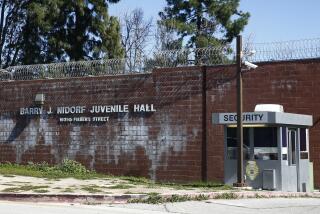Making A Difference : SHORTSTOP: Keeping Kids On Base
The Justice Department reported earlier this month that juveniles were responsible for one in five violent crimes in 1991, the latest year for which they have analyzed data. With a population “mini-boom” of teen-agers about to greatly increase the numbers of youths in society, heading off teen-age crime is a high priority.
Among the most promising prevention ideas the Orange County Bar Foundation’s program called Shortstop, which steps in after a youth’s first run-in with the law. The program, founded in 1980, provides a rigorous course for offenders ages 10 to 17 and their parents. Graduates are rewarded with a clean criminal record.
A Spanish version, Programa Shortstop, was added in 1989 and includes additional instruction on substance abuse and gangs, funded by a federal grant.
More than 12,000 people, young offenders and their families, have gone through the program. A 1992 study by Orange County probation officials found a high success rate--92% of those in the English version and 78% of those in the Spanish version had no further legal problems within a year after graduating.
HOW IT WORKS
SELECTION: Children are referred by police, probation or school officials or even worried parents. Families agree to participate in several sessions held at night in a courtroom in either Santa Ana or Newport Beach. The kids are assigned a number and told to temporarily surrender their possessions.
THE HOLDING CELL: Children and their parents are put into a mock lockup, where wards from the California Youth Authority offer “reality therapy” about what awaits them if they continue to get in trouble. “Kids pale with fear when they hear the graphic stories (about life in juvenile detention facilities) and parents often end up sobbing,” Bonner says.
THE HOT SEAT: Each youth then “confesses” the crime in front of the group. Attorneys and other legal specialists grill the children about the effects of their actions on the victim and their own parents.
THE MUG SHOT: Kids are photographed in jail as a lasting reminder to stay in front of the bars.
THE HOMEWORK: Families have to complete 10 assignments. They include writing a letter to the victim, interviewing a community volunteer to learn about positive role models and complimenting one another. Parents and child must also write a eulogy for the child, as if he or she had died.
*
Costs per year:
Shortstop, per family: $500
Probation: $3,650
Juvenile Hall: $27,375
California Youth Authority: $32,850
(Shortstop’s $400,000 annual budget comes from foundations, corporations and community fund-raisers.)
*
One Family’s Experience
“My friend and I were in Price Club and thought we’ steal some cigarettes to sell at school since I had my backpack. The adrenaline was pumping and it seemed cool. When we got caught, I wanted to run away. My parents were so upset. The worst part of Shortstop was being in the hot seat, seeing my parents go through it again when I had to confess. Now I work at Sears and understand that shoplifting makes prices go up for everybody. I keep my Shortstop mug shot up in my room to remind me I don’t want to ever go to jail.”
--CHRIS SHARP, 16, a junior at Villa Park High School in Orange who graduated from Shortstop in December, 1993
*
“When we picked up Chris after the store called, I was hysterical. I was desperate to have him realize how serious this was and called juvenile hall, which gave us Shortstop’s number. It’s made a world of difference: He’s much more responsible and his grades are better. We were so impressed that we’ve been volunteering at the Shortstop office since.”
--DAISY SHARP, Chris’ mother, Orange
*
AN OBSERVER’S VIEW
“What makes this program unique is that it’s collaborative and family-oriented,which is where change has to take place. It combines powerful experiences like the hot seat with a good dose of legal education so parents and kids learn the full repercussions of their actions.”-RICHARD CERVANTES, Assistant professor of psychology, USC School of Medicine
For more information, call Shortstop at (714) 851-2575.
To Get Involved: Call (714) 851- 2575
More to Read
Sign up for Essential California
The most important California stories and recommendations in your inbox every morning.
You may occasionally receive promotional content from the Los Angeles Times.










